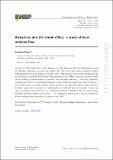Analyticity and the Unruh effect: a study of local modular flow
Author(s)
Sorce, Jonathan
Download13130_2024_Article_24417.pdf (657.8Kb)
Publisher with Creative Commons License
Publisher with Creative Commons License
Creative Commons Attribution
Terms of use
Metadata
Show full item recordAbstract
The Unruh effect can be formulated as the statement that the Minkowski vacuum in a Rindler wedge has a boost as its modular flow. In recent years, other examples of states with geometrically local modular flow have played important roles in understanding energy and entropy in quantum field theory and quantum gravity. Here I initiate a general study of the settings in which geometric modular flow can arise, showing (i) that any geometric modular flow must be a conformal symmetry of the background spacetime, and (ii) that in a well behaved class of “weakly analytic” states, geometric modular flow must be future-directed. I further argue that if a geometric transformation is conformal but not isometric, then it can only be realized as modular flow in a conformal field theory. Finally, I discuss a few settings in which converse results can be shown — i.e., settings in which a state can be constructed whose modular flow reproduces a given vector field.
Date issued
2024-09-09Department
Massachusetts Institute of Technology. Center for Theoretical PhysicsJournal
Journal of High Energy Physics
Publisher
Springer Berlin Heidelberg
Citation
Sorce, J. Analyticity and the Unruh effect: a study of local modular flow. J. High Energ. Phys. 2024, 40 (2024).
Version: Final published version